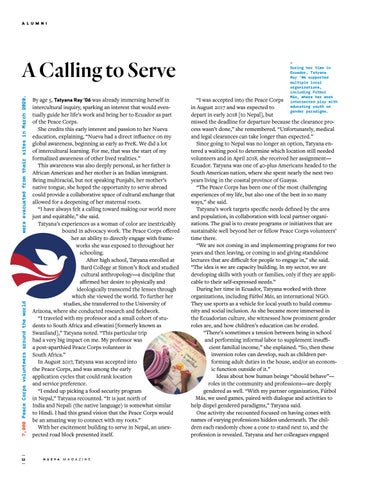A L U M N I
7,000 Peace Corps volunteers around the world
were evacuated from their sites in March 2020.
A Calling to Serve
52
By age 5, Tatyana Ray ’06 was already immersing herself in intercultural inquiry, sparking an interest that would eventually guide her life’s work and bring her to Ecuador as part of the Peace Corps. She credits this early interest and passion to her Nueva education, explaining, “Nueva had a direct influence on my global awareness, beginning as early as PreK. We did a lot of intercultural learning. For me, that was the start of my formalized awareness of other lived realities.” This awareness was also deeply personal, as her father is African American and her mother is an Indian immigrant. Being multiracial, but not speaking Punjabi, her mother’s native tongue, she hoped the opportunity to serve abroad could provide a collaborative space of cultural exchange that allowed for a deepening of her maternal roots. “I have always felt a calling toward making our world more just and equitable,” she said. Tatyana’s experiences as a woman of color are inextricably bound in advocacy work. The Peace Corps offered her an ability to directly engage with frameworks she was exposed to throughout her schooling. After high school, Tatyana enrolled at Bard College at Simon’s Rock and studied cultural anthropology—a discipline that affirmed her desire to physically and ideologically transcend the lenses through which she viewed the world. To further her studies, she transferred to the University of Arizona, where she conducted research and fieldwork. “I traveled with my professor and a small cohort of students to South Africa and eSwatini [formerly known as Swaziland],” Tatyana noted. “This particular trip had a very big impact on me. My professor was a post-aparthied Peace Corps volunteer in South Africa.” In August 2017, Tatyana was accepted into the Peace Corps, and was among the early application cycles that could rank location and service preference. “I ended up picking a food security program in Nepal,” Tatyana recounted. “It is just north of India and Nepali (the native language) is somewhat similar to Hindi. I had this grand vision that the Peace Corps would be an amazing way to connect with my roots.” With her excitement building to serve in Nepal, an unexpected road block presented itself.
N U E V A
M A G A Z I N E
→
During her time in Ecuador, Tatyana Ray ’06 supported multiple local organizations, including Fútbol Más, where her work intersected play with educating youth on gender paradigms.
“I was accepted into the Peace Corps in August 2017 and was expected to depart in early 2018 [to Nepal], but missed the deadline for departure because the clearance process wasn’t done,” she remembered. “Unfortunately, medical and legal clearances can take longer than expected.” Since going to Nepal was no longer an option, Tatyana entered a waiting pool to determine which location still needed volunteers and in April 2018, she received her assignment— Ecuador. Tatyana was one of 40-plus Americans headed to the South American nation, where she spent nearly the next two years living in the coastal province of Guayas. “The Peace Corps has been one of the most challenging experiences of my life, but also one of the best in so many ways,” she said. Tatyana’s work targets specific needs defined by the area and population, in collaboration with local partner organizations. The goal is to create programs or initiatives that are sustainable well beyond her or fellow Peace Corps volunteers’ time there. “We are not coming in and implementing programs for two years and then leaving, or coming in and giving standalone lectures that are difficult for people to engage in,” she said. “The idea is we are capacity building. In my sector, we are developing skills with youth or families, only if they are applicable to their self-expressed needs.” During her time in Ecuador, Tatyana worked with three organizations, including Fútbol Más, an international NGO. They use sports as a vehicle for local youth to build community and social inclusion. As she became more immersed in the Ecuadorian culture, she witnessed how prominent gender roles are, and how children’s education can be eroded. “There’s sometimes a tension between being in school and performing informal labor to supplement insufficient familial income,” she explained. “So, then these inversion roles can develop, such as children performing adult duties in the house, and/or an economic function outside of it.” Ideas about how human beings “should behave”— roles in the community and professions—are deeply gendered as well. “With my partner organization, Fútbol Más, we used games, paired with dialogue and activities to help dispel gendered paradigms,” Tatyana said. One activity she recounted focused on having cones with names of varying professions hidden underneath. The children each randomly chose a cone to stand next to, and the profession is revealed. Tatyana and her colleagues engaged










